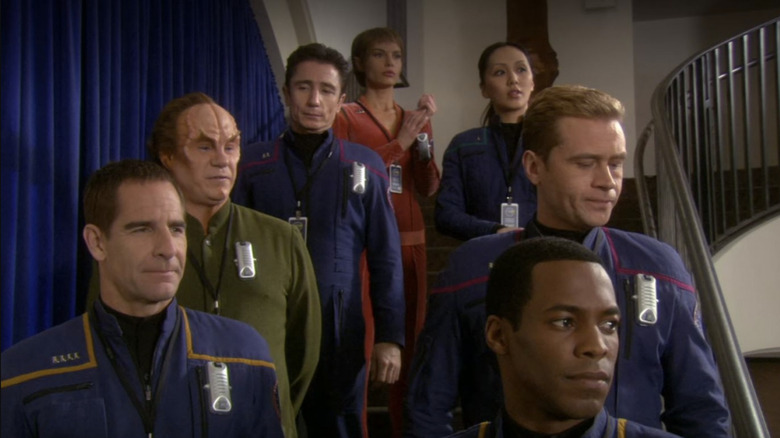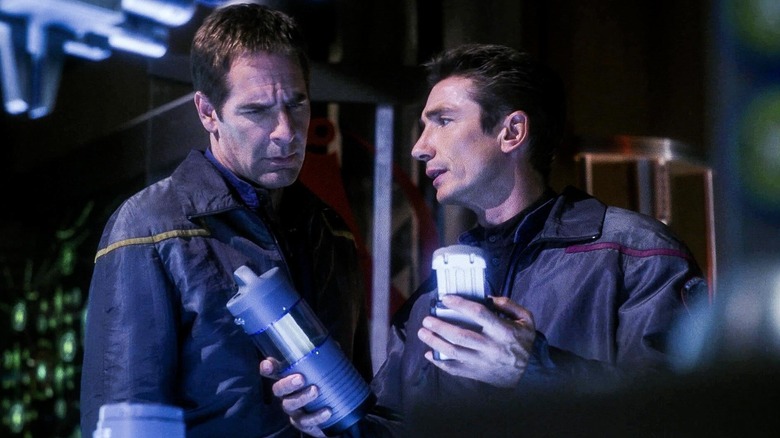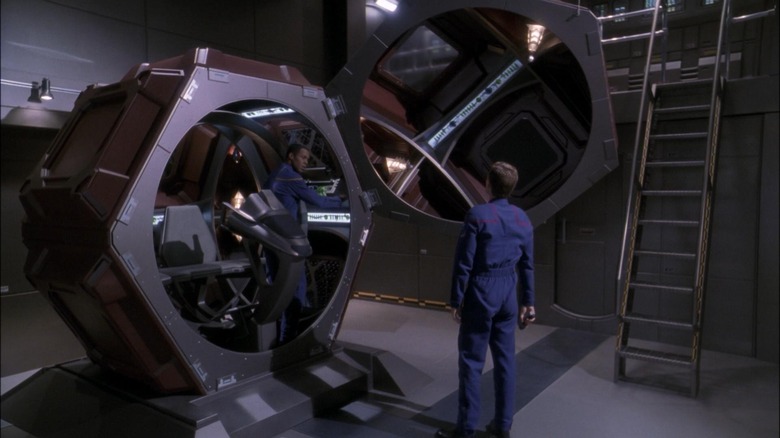One Sentence Defined The Entire 'Philosophy' Of Star Trek: Enterprise
By 2001, "Star Trek" had — for better or for worse — fallen into a groove. "Star Trek: The Next Generation" launched in 1987 and took place almost a century after the events of the original series. It was bold new ground to cover for the then-20-year-old franchise, and the universe of the 24th century had to be built from the ground up. Over the next few years, "Next Generation" established how strong and dynamic a series it was, clearly distinguishing itself from its forebear. Indeed, "Next Generation" became so popular that when "Star Trek: Deep Space Nine" debuted in 1993, it took place within the same time frame.
Then, keeping the ball rolling, the 1995 series "Star Trek: Voyager," continued directly in the same timeline, running concurrently with "Deep Space Nine" (albeit in an entirely different part of the galaxy). The continuation of the same NextGen timeline into "Deep Space Nine" and "Voyager" only proves how powerful NextGen was in the first place.
In 2001, "Deep Space Nine" had ended, and "Voyager" was drawing to a close, each having lasted seven seasons. When a new "Star Trek" series was put into production, it needed to be unique. As such, Rick Berman and Brannon Braga created "Enterprise" (later, "Star Trek: Enterprise"), a show that was set a century prior to the original series. it was to have a new aesthetic, throwback technology, and, naturally, a new philosophy.
That philosophy was discussed by Stephen Beck, writer of 18 "Enterprise" episodes. In "The Fifty-Year Mission: The Next 25 Years: From The Next Generation to J. J. Abrams," written by Mark A. Altman and Edward Gross, Beck recalls the conversation he had with Braga about the underlying thrust of "Enterprise." It seems that stories were infinite.
The infinity of Star Trek
One might assume that a prequel series would be limiting to a writer. After all, the events of a prequel would, by necessity, have to link directly into an entertainment franchise's extant lore, potentially stymieing a writer's ability to stretch. "Enterprise," for instance, couldn't blow up the Earth in the 22nd century because we know it's still there in the 23rd. That sort of thing.
Beck, however, didn't think of "Enterprise" in those terms. Instead, he thought of "Enterprise" as a fresh start, a way to begin with a "Star Trek" tabula rasa that could be filled with a lot of complex lore that didn't need to link directly back to the 1966 "Star Trek." Beck recalled his interview with Brannon Braga, and how his viewpoint clicked with the showrunner immediately. Beck said:
"I wrote a spec script for 'Chicago Hope' and they hired me. I was, at that point, not only medical director of a clinic, but I was medical director for Sentinel Hospital. And yet it was no decision at all. It was my dream, so I went to 'Chicago Hope.' And then my next job was 'Seven Days,' followed by 'Enterprise.' I said something that hit Brannon, and he said, 'That's the philosophy of the show.' I said it appealed to me that you get to start over and that you have an infinite amount of stories that you can tell. I remember him saying, 'Yes, that's it.'"
"Enterprise," although the sixth "Star Trek" series, was the least nostalgic of the bunch, trying to explore a span of Trek history that hadn't ever really been looked at closely. There was way more room to play than a casual glance might reveal.
But then, that was the issue, wasn't it?
With a century of "Star Trek" history to fill in, the writers did an exemplary job of exploring new things that had never been mentioned in previous "Star Trek" shows. They noted that certain kinds of space radiation can cause psychosis and that Starfleet had to develop protections against it. Vulcans didn't always know how to mind-meld. Heck, there was even a cataclysm and a war with the Xindi that had never been alluded to before. We knew that the Prime Directive lay ahead, but there were a lot of stories and mistakes that could be told and made on the way to it.
Unfortunately, "Enterprise" was also part of a massive franchise that had become accustomed to filming shows and presenting ideas in a specific way. Everyone wanted to rattle the zeitgeist, but the zeitgeist was already firmly established. Beck stated the conflict thus:
"They wanted to shake it up with people that didn't know the system. Now that's where I think part of the problem came from, because there were people that didn't understand the system and were trying to do something different, but their system had been running for twenty-five years."
In brief, the makers of "Star Trek" seemed to be courting an audience of non-Trekkies, hoping to win them over with something different than all the Treks that came before. True Trekkies, they may have felt, would tag along regardless. Sadly, in show ultimately found a middle path that didn't wholly satisfy anyone. The series was largely good, and showed a lot of growth in its four years, but ultimately was cut short. C'est la vie.


